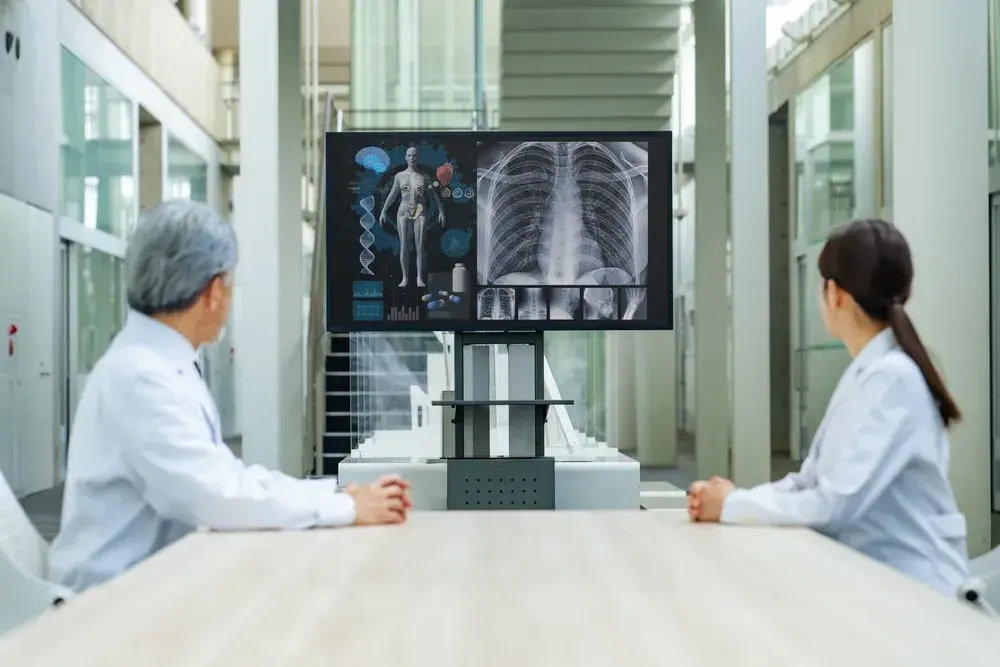PLANO, TX — February 2026 — PracticeEHR has earned recognition as a 2026 FrontRunner for Electronic Medical Records by Software Advice. The FrontRunners report identifies top-performing software products by evaluating...
Internists, or Doctors of Internal Medicine, are at the forefront of diagnosing, treating, and providing compassionate care for adults facing various health issues. Their expertise spans from managing everyday health concerns to tackling complex conditions like Type 2 diabetes and heart disease. They are uniquely prepared to address not just isolated diseases but also the challenges that arise when multiple illnesses affect a patient simultaneously.
Given the intricate and multifaceted nature of their work, internists require reliable support systems to provide the best care possible. A key component of this support is an efficient Electronic Health Records (EHR) system, which is vital for navigating the complexities of internal medicine.
In this blog, we'll explore the essential features that internal medicine practices should look for in internal medicine EHR software, ensuring they can meet their patients' needs effectively and efficiently.

1. Comprehensive Patient Records
At the heart of internal medicine practice management lies the need for comprehensive patient records, a feature that stands as the cornerstone of any internal medicine EHR system. These records serve as a detailed catalog of a patient's healthcare journey, covering everything from initial consultations to diagnostic tests, treatment plans, and follow-up care.
Moreover, the integration of internal medicine RCM (Revenue Cycle Management) within the EHR enhances the efficiency and financial sustainability of practices by streamlining billing processes and improving reimbursement rates.
An efficient internal medicine EHR, like Practice EHR, ensures that vital patient information is easily accessible yet securely stored, facilitating a seamless flow of information between departments. Thus, this supports the delivery of high-quality care and enables internists to make informed decisions.
2. Medication Management
Effective medication management is critical in internal medicine, given the complex health profiles often encountered. An internal medicine EHR system plays a crucial role in ensuring that medication regimens are accurately managed and seamlessly integrated into the broader spectrum of patient care.
Furthermore, the coordination between internal medicine RCM and medication management cannot be overstated. By accurately documenting medication orders and adherence, practices can ensure proper billing and reimbursement, thus enhancing the practice's financial health.
Moreover, an advanced internal medicine EHR system, like Practice EHR, offers e-prescribing capabilities that streamline the prescription process and significantly reduce the potential for errors. With built-in drug interaction checks, these systems provide an additional layer of safety, ensuring that patients receive the most suitable and effective medications for their conditions.
3. Customizable Templates
Customizable templates offer efficiency in internal medicine, significantly enhancing the utility of internal medicine EHR systems. These templates are the backbone of streamlined internal medicine practice management, tailored to meet the unique needs of each practice.
By allowing for the adaptation of patient encounter forms, clinical notes, and treatment plans, customizable templates ensure that the specific demands of internal medicine are meticulously catered to.
Moreover, integrating these templates with internal medicine RCM processes is a game-changer. It ensures that all necessary information is captured accurately and comprehensively, facilitating smoother billing cycles and improving financial outcomes.
This harmonious integration underscores the importance of an efficient internal medicine EHR system, like practice EHR, in delivering optimum care. Additionally, tracking medication adherence within the EHR empowers providers to engage in more meaningful conversations with their patients, reinforcing the importance of following prescribed treatments.
4. Patient Portal
The Patient Portal feature within an internal medicine EHR system is an essential bridge connecting patients and healthcare providers in internal medicine. This digital gateway empowers patients, granting them unprecedented access to their health information fostering a transparent and collaborative healthcare environment.
Moreover, the patient portal is a standard in modern internal medicine practice management, offering features such as online appointment scheduling, secure messaging, and access to lab results and medication lists. This level of accessibility enriches the patient experience and streamlines administrative tasks, reducing the burden on healthcare staff and allowing for more focused patient care.
Additionally, the patient portal encourages patients to take an active role in their healthcare journey. By providing educational resources and reminders for preventive care, the portal supports the proactive management of health, which is particularly crucial in internal medicine, where early intervention can significantly alter health outcomes.
5. Interoperability
Interoperability within internal medicine represents a transformative feature of internal medicine EHR systems, crucial for the seamless exchange and utilization of healthcare information across various platforms and providers.
This feature ensures that every stakeholder in the healthcare sector—from primary care physicians to specialists and beyond—can access and share vital patient data efficiently. Such seamless communication enhances care coordination, a fundamental aspect of internal medicine practice management.
Moreover, integrating interoperability with internal medicine RCM streamlines the billing process, ensuring that financial operations are as efficient as the clinical care provided. This coordination between clinical and financial data optimizes revenue flow and minimizes administrative burdens, allowing healthcare providers to concentrate on their primary mission: optimal patient care.

6. Data Security and Compliance
The importance of patient data security and compliance cannot be overlooked. An efficient and reliable internal medicine EHR system, like Practice EHR, embodies this principle, safeguarding patient information with the utmost integrity and adherence to stringent regulations.
This commitment to security is not just a compliance measure but a prerequisite for trust between patients and healthcare providers, essential in the sensitive domain of internal medicine practice management.
A secure EHR system ensures that financial transactions and patient data are protected against breaches, reinforcing the financial and operational stability of healthcare practices. This integration is vital, as it upholds the privacy and security standards mandated by healthcare regulations, including HIPAA, thus safeguarding the practice against potential legal and financial repercussions.
Conclusion
From comprehensive patient records to medication management, customizable templates, patient portals, interoperability, and unwavering data security and compliance, these features collectively enhance the efficiency, effectiveness, and reliability of patient care delivery.
They streamline internal medicine practice management and RCM processes and significantly improve patient outcomes by fostering a more connected, secure, and patient-centered healthcare experience. Thus, the need for a reliable and efficient EHR system, like Practice EHR, for internal medicine practices can not be overlooked.
Topics: Patient Care, EHR Solution, Specialty-Specific EHR, digital age, Industry Update, Medical Billing, Medical billing services, RCM, EHR, Technology in Healthcare, Kiosk, EHR Features, ePrescribing, Internal Medicine EHR
RECENT POSTS



TOPICS
- EHR Solution (193)
- EHR (127)
- digital age (120)
- Patient Care (117)
- Medical Billing (112)
- Specialty-Specific EHR (112)
- Industry Update (98)
- Technology in Healthcare (84)
- EHR Features (79)
- Small Practice (78)
- Medical billing services (74)
- Integrated EHR (64)
- RCM (64)
- HIPAA Security (62)
- Cloud-based EHR (44)
- New Technology (44)
- Telemedicine (44)
- Healthcare Office Management (40)
- Practice EHR News (40)
- Kiosk (31)
- Revenue Cycle Management (28)
- AI Solutions (26)
- ePrescribing (21)
- AI Scribing (17)
- Best EHR Software (17)
- Practice Management Software (13)
- AI EHR (12)
- AI-powered Medical Billing (12)
- EMR (12)
- TeleVisit (12)
- AI Scribe (11)
- Practice Automation (11)
- Client Favorites (10)
- The ONE (10)
- AI scanning (9)
- Switching to New EHR (9)
- Urgent Care (9)
- Best EHR Practice (8)
- EHR Integration (8)
- MACRA/MIPS (8)
- Patient Portal (8)
- Psychiatry EHR (8)
- Medical Practice Management Software (7)
- Automated Health Tools (6)
- E-Prescribing (6)
- Product Updates (6)
- events (6)
- MIPS (5)
- Mobile EHR (5)
- Telehealth Platforms (5)
- Family Medicine EHR (4)
- HIPAA (4)
- Insider (4)
- Integrated Practice Management (4)
- Internal Medicine EHR (4)
- MIPS Reporting (4)
- Multilingual AI Scribe (4)
- Orthopedics EHR (4)
- Podiatry (4)
- Podiatry EHR (4)
- Regulatory Updates (4)
- Telehealth Platform (4)
- Automated EHR (3)
- Chiropractic EHR (3)
- Digital Experiences (3)
- EHR Flaws (3)
- EHR Implementation (3)
- EHR for Chiropractors (3)
- EHR for Small Practices (3)
- Eligibility Verification in Medical Billing (3)
- Medical Coding Services (3)
- Patient Check-in Kiosk (3)
- PracticeEHR GO App (3)
- AI Scan (2)
- Cash Flow (2)
- Cashless Payments (2)
- Clearinghouse (2)
- Dermatology EHR (2)
- EHR Scheduling (2)
- Family Medicine (2)
- Foot and Ankle Care (2)
- Foot and Ankle EHR (2)
- Health records 101 (2)
- Healthcare Compliance Certification (2)
- Medical Billing Partner (2)
- Medical Credentialing (2)
- Pediatrics EHR (2)
- Quality of Patient Care (2)
- Reporting Under MIPS (2)
- Risk and Liability in Medical Settings (2)
- Voice-Activated AI Scribe (2)
- What Works Clearinghouse (2)
- ACA Subsidy (1)
- AI Scribe for Pediatric Care (1)
- Bariatric EHR (1)
- Behavioral Health Practices (1)
- Billing Communication (1)
- Billing for Private Practices (1)
- Cardiology EHR (1)
- Charting (1)
- Data Security (1)
- Dos and Don'ts (1)
- EHR Dashboard (1)
- EHR Guides (1)
- EHR KPIs (1)
- EHR Questions to Ask (1)
- EHR Transition (1)
- EHR for Chronic Illness (1)
- EMR vs EHR Difference (1)
- ENT EHR (1)
- Endocrinology EHR (1)
- Gastroenterology (1)
- Gastroenterology EHR (1)
- General Surgery EHR (1)
- Geriatric AI scribe (1)
- Geriatrics EHR (1)
- Guides (1)
- Healthcare Practice Office Management (1)
- Help Center Videos (1)
- Insurance Reimbursement (1)
- KPI (1)
- Key Performance Indicators (1)
- Lab Processing (1)
- MACRA (1)
- Nephrology EHR (1)
- Neurology EHR (1)
- Pain Management EHR (1)
- Patient Behavior (1)
- Pediatric Care (1)
- Physical Therapy EHR (1)
- Practice Cash Flow (1)
- Practice Efficiency (1)
- Pulmonology EHR (1)
- Reconsider Your EHR (1)
- Simplify Practice Management (1)
- Staffing in Healthcare (1)
- Switch Medical Billing Providers (1)
- Urgent Care Medical Billing (1)
- Urology EHR (1)
- insurance claim denials (1)








